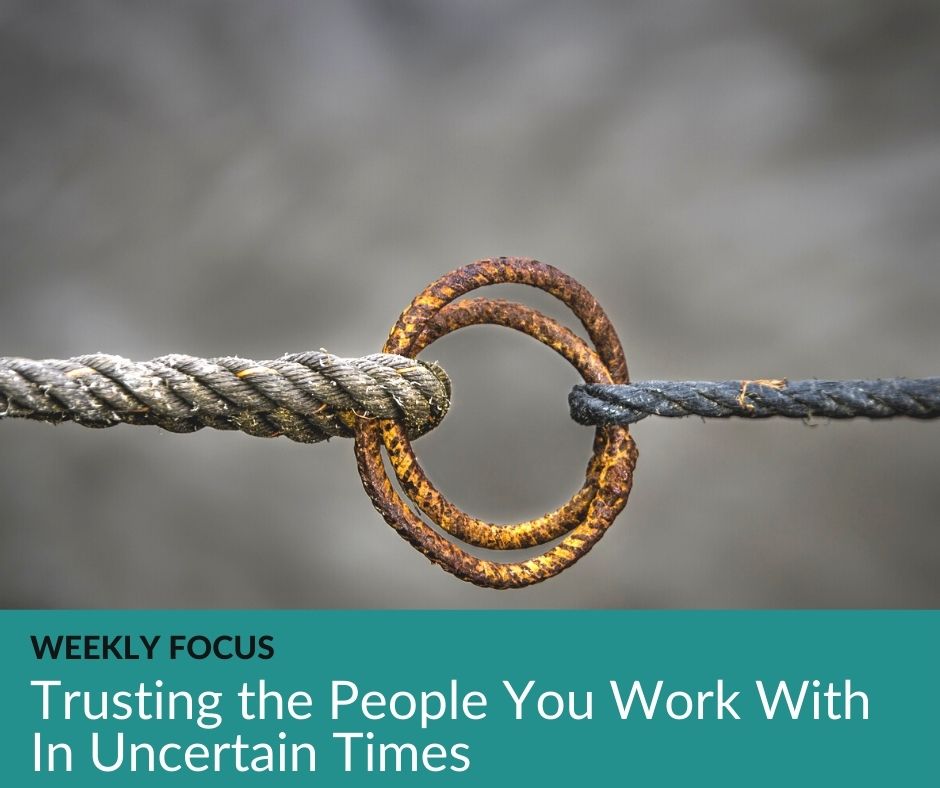How to Trust Ourselves and Our Situation When Nothing Seems Certain
This fall, I have had a full teaching schedule. Whether online or in-person classrooms, when I look around the room, I see the faces of human beings who are emotionally exhausted from all the good news/bad news cycles. We don’t know if we can breathe again or shut down, get close to people or avoid them. Do we trust our institutions or suspect the worst.? How do we find what we need within ourselves to see a brighter future?
Some people look tired or even exhausted, while others appear grateful to be around people – finally! Participants at in-house workshops may see it as a good sign that the pandemic may be under control.
But no matter what, there is still an anxious feeling in the atmosphere.
I could stop there, but I would be doing us all a disservice. Because beyond the anxiety, I see the light in each human soul and how it fuels our personal and collective resiliency.
We are getting there. We know what to do. We just need to do it.
The Past is History
Although we are not sure of our future, we know the road ahead will not be the same as the past. Things have changed; people changed. Our future depends on how we treat one another as we rebuild it.
The Key is How We Decide to Treat One Another
Last year, I wrote a guide entitled Leadership Lessons for Uncertain Times. I thought by now it would be old news, but it is, in fact, relevant and essential. Supervisors, managers, and leaders within organizations can help guide the ship through rocky seas – and it begins with some simple steps.
I reminded people to look after their self-care. The simple notion is that if you do not take care of yourself, you cannot look after others.
In a recent workshop, we went back to basics and remembered the value of breathing to refocus and reduce stress. It was the right message at the right time. Throughout the organization, people shared the impact it was having on their well-being. So here it is for you.
Manage Expectations
We need to be honest about what we know and what we don’t know, what we can guarantee, and our best guess.
Check-in with your teams more.
Have you heard about the Hawthorne Effect? It proposes that people perform better when others pay attention to them as people and not only to their performance. Although they initially assumed it was because of the conditions changed by the researchers that participants performed better. But after time, it became clear that people responded and felt motivated that others were paying attention to them. They felt noticed, and what they did or did not do mattered to the whole.
Human beings have an internal need to be appreciated for their value to a family, person, and/or the organizations they work to improve.
Everyone owns this job. It is not the role of a particular department or person. Each of us bears responsibility for letting other human beings know that they matter to us and our workplace.
One Thing You Can Know for Sure
In every classroom, when asked this question: “what is one thing you have complete control over and if you implemented it would improve your relationships with colleagues at work?” participants respond similarly.
To be intentional in how we relate to others.
Participants suggest things like: Be More Intentional…
- when spending time with people.
- with their listening.
- about acknowledging others in the workplace.
- about how they show up in the workplace, knowing that our human energy is infectious to those around us.
- to commit to taking care of themselves more.
- in their communication with others.
- to refrain from judging others
- to practice empathy towards the human beings with whom they work with
Empathy – How Hard Can That Be?
Empathy sounds easy. It may take more effort than you expect. People often ask me what empathy looks like? How does one practice empathy?
Below is a list of 20 action items that will help increase your empathy.
Try a few and see how they work for you.
Twenty Practical Applications of Empathy
- Listen and don’t interrupt
- Focus 100% on the other person
- Be FULLY present (get rid of the phone)
- Use people’s first names
- Be nice and care
- Take turns talking and listening
- Acknowledge the person’s feelings
- Put yourself in their shoes
- Allow the person to rant a little
- Don’t judge
- Park your beliefs
- Ensure your body language is open and receptive looking
- Smile
- Don’t finish their sentences
- Make it about them and not about you
- Use “we” not “me.”
- Don’t have all the answers
- Ask how you can help
- Summarize your understanding
- Don’t assume you know what they are going to say
In the Words of Ted Koppel from 1998
Ted Koppel ended his commencement speech to a graduating class at Stanford University in 1998 “Aspire to decency; practice civility,” with these words:
There is no mystery here. You know what to do. Now go out and do it!






